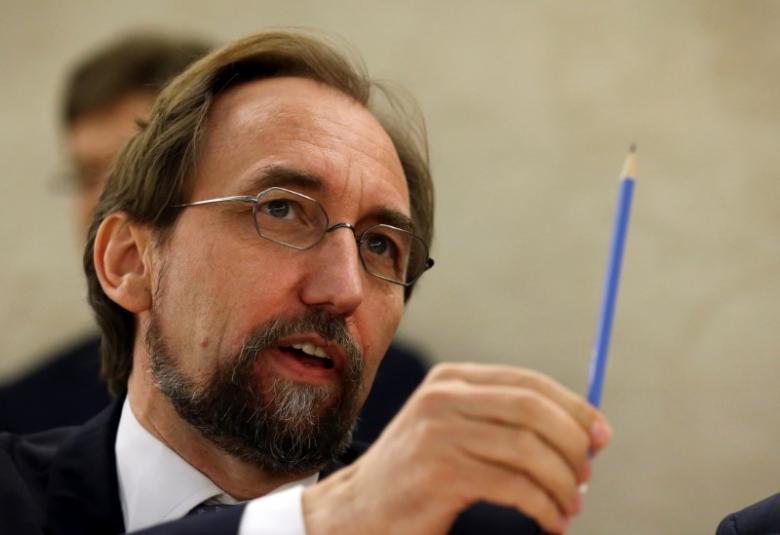United Nations High Commissioner for Human Rights Zeid Ra’ad al-Hussein decried on Tuesday an unfolding “calamity” in Aleppo, warning Russia over the use of incendiary weapons in the embattled Syrian city.
He added that crimes by one side did not justify illegal acts by the other.
Zeid called for bold new initiatives “including proposals to limit the use of the veto by the permanent members of the Security Council”, which would enable the U.N. body to refer the situation in Syria to the International Criminal Court (ICC).
Russia, an ally of Syria’s regime, holds veto power along with the United States, France, Britain and China.
“Such a referral would be more than justified given the rampant and deeply shocking impunity that has characterized the conflict and the magnitude of the crimes that have been committed, some of which may indeed amount to war crimes and crimes against humanity,” Zeid said in a statement.
Syria’s regime and its allies had undertaken a “pattern of attacks” against targets with special protection under international humanitarian law, including medical units, aid workers and water-pumping stations, he said.
Russia is a key player in the Syrian civil war by virtue of its military support for President Bashar al-Assad and its role as one of five veto-holding powers on the Security Council.
The use of indiscriminate weapons such as incendiary weapons in heavily populated areas was of particularly grave concern, Zeid said, drawing a parallel with the battles of Warsaw, Stalingrad and Dresden during World War Two.
Zeid described the attacks over the last 10 days in rebel parts of Aleppo, including airstrikes by Syrian and Russian forces, as “the most intense” there since Syria’s civil war began in 2011.
“I remind all State parties to Protocol III of the Convention on Certain Conventional Weapons, including the Russian Federation, that they are strictly prohibited from using incendiary weapons in airstrikes on heavily populated areas, and that the use of such weapons by ground forces is severely restricted,” Zeid said.
The rebels’ use of inaccurate “hell-fire cannons”, homemade mortars that fire gas cylinders packed with explosives and shrapnel, was also totally unacceptable, he said.
Designating the enemy as a “terrorist organization” was not an excuse to ignore the laws of war, Zeid said.
World Health Organization spokeswoman Fadela Chaib said that between Sept. 23 and Oct. 2, 342 people had been killed in eastern Aleppo, including 106 children, and 1,129 injured, including 261 children.
Those figures were based on reports from functioning health centers and the true figures were probably much higher, she said.
“As of yesterday, we had only six partially functioning hospitals that are in service, only one hospital that offers trauma services,” Chaib told the briefing.
Meanwhile, rebels said on Tuesday they repelled a Syrian army offensive in southern Aleppo as Russian and Syrian warplanes continued to pound residential areas in besieged parts of the city where thousands of civilians are trapped.
They said they inflicted losses on pro-regime fighters after several hours of clashes on the fringe of Sheikh Saed district, at the southern edge of the rebel-held eastern half of Aleppo city.
“We repelled their attempt to advance in Sheikh Saed and killed 10 regime fighters and destroyed several vehicles,” said a fighter from the Failaq al-Sham rebel group who gave his name as Abdullah al-Halabi.
Pro-government media said the army was pressing ahead in a major campaign supported by Iranian-backed militias and Russian air power to take full control of the divided city after a ceasefire collapsed last month.
The offensive is backed by an air campaign by head of Syrian regime Bashar al-Assad’s government and its allies that has hit hospitals, destroyed infrastructure and caused hundreds of civilian casualties.
Another rebel commander from the Nour al-Din al-Zinki group said regime forces opened several fronts simultaneously to stretch the rebel forces, and dropped leaflets from helicopters calling on them to surrender.
